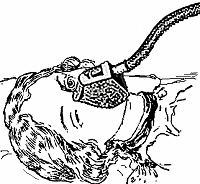 There have been a number of reports of a speech or presentation by Dr. Jaideep Pandit to the Annual Congress of the The Association of Anaesthetists of Great Britain and Ireland (AAGBI) in Dublin, in which he apparently proposed the existence of a ‘third’ state of consciousness.
There have been a number of reports of a speech or presentation by Dr. Jaideep Pandit to the Annual Congress of the The Association of Anaesthetists of Great Britain and Ireland (AAGBI) in Dublin, in which he apparently proposed the existence of a ‘third’ state of consciousness.
Dr Pandit led the fifth annual survey (NAP5) by the AAGBI on the subject of accidental awareness, in which patients who have been anaesthetised for an operation become conscious during the procedure but are unable to do anything because some of the drugs they are normally given induce paralysis. Anaesthetists used to believe that even though patients couldn’t move, it was generally possible to tell when they were becoming aware, through signs of distress like the heartrate and sweating, allowing the anaesthetist to give further doses to correct the problem: but it has become clear that this is not always the case and that significant numbers of patients do go through severe pain, or are at least aware of what is going on, while on the operating table.
There are extremely difficult methodological issues involved in assessing how often this happens. Besides drugs to paralyse patients and remove the pain, they are typically given drugs which erase any memory. Of those who do become conscious during surgery, only a minority report it afterwards. On the other side, many patients may dream or confabulate an awareness that never really existed. Nevertheless the AAGBI’s annual surveys are a valuable and creditable effort to provide some data.
The point about the ‘third state’ does not arise so much from the survey, however, as separate research carried out by Dr Ian F Russell: I haven’t been able to track down the particular paper which I think was referred to in Dublin, but there’s a useful general article which covers the same experiments here. The techniques used in this case was to keep one forearm unparalysed and then ask the patient at repeated intervals to squeeze with their hand. Russell found that 44% of patients woulod respond even though they were otherwise apparently unconscious and had no recollection of the episode.
How aware wee these patients? They were able to hear and understand the surgeon and respond appropriately, yet we can, with some caveats, presume that they were not in pain. If they had been in agony, these patients, unlike most, coulod have waved their hand and would surely have done so – unless the state they were in somehow allowed them to respond to requests but not to initiate any action; or possibly left them too confused even to formulate the simple plan of attracting attention, but not so confused that they could not respond to a simple request. At any rate, it is this curiously ambivalent condition which has prompted Dr Pandit’s suggestion of a third state of consciousness.
We might observe that it probably isn’t really the third, but perhaps the seventh (or the seventeenth). We already have dreaming, hypnosis, sleepwalking, and meditation to take into account, and very likely we could come up with more. The normal mental state of human beings appears to be complex and layered, and capable of breaking down or degrading in ways you wouldn’t have expected.
There’s a moral there for artificial general intelligence, I suppose: if you really want to model human thought, you’re going to need it to operate on a number of levels at once, rather than having a single ‘theatre’ or workspace where mental content does its stuff. It may of course be that we don’t especially want to model specifically human styles of thought. Perhaps a single level cognitive structure will prove perfectly good for most practical tasks; perhaps it will even be an improvement. That raises the interesting possibility of sitting down to have a conversation with a robot friend who seems to be pretty much like us, but has no unconscious. What would people with no unconscious be like? An outside possibility is that they would be fine at ‘easy problem’ stuff, but lack phenomenal depth; perhaps they would be the philosophical zombies hose lack of qualia has featured in so many papers.
More generally, the existence of a state in which we remember nothing and experience no pain, but comply helpfully with requests made to us in normal language suggests that either the self as normally envisaged is not as much in executive control as it thinks – a conclusion which would be supported by various other bits of evidence – or that it is less unitary than we generally suppose. Indeed, we might see this as at least persuasive evidence for the existence of a slightly unexpected degree of modularisation. The ‘third state’ and hypnotic states suggest that there might be a kind of ‘implementer’ function in the brain. This implementer is responsible for actually getting actions carried out; normally it reacts so fast to the least indication from our self-conscious interior monologue that we don’t even notice it; to us it just seems that what we wanted happened. But in certain unusual states the talky, remembering, self-conscious bit of our mind can be turned off while the butler-like implementer is still around and in the absence of the usual boss, quite happy to respond to instructions from outside (and quite capable of using all the language-processing functions of the brain to understand them with).
In its way I find that almost as unsettling as the AAGBI’s conclusions about the surprisingly frequent ineffectiveness of anaesthesia.
